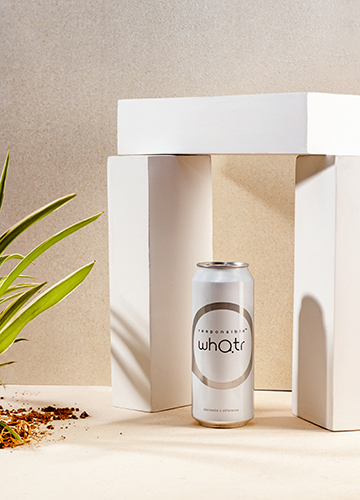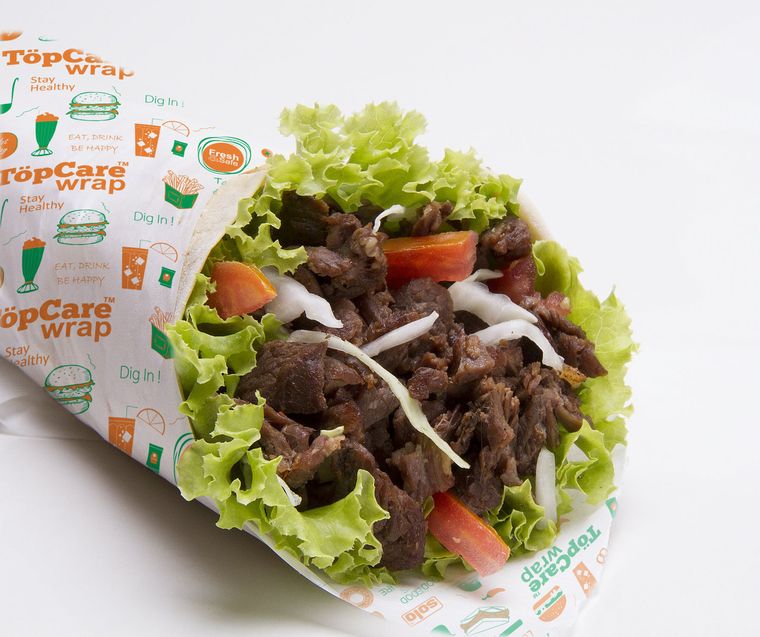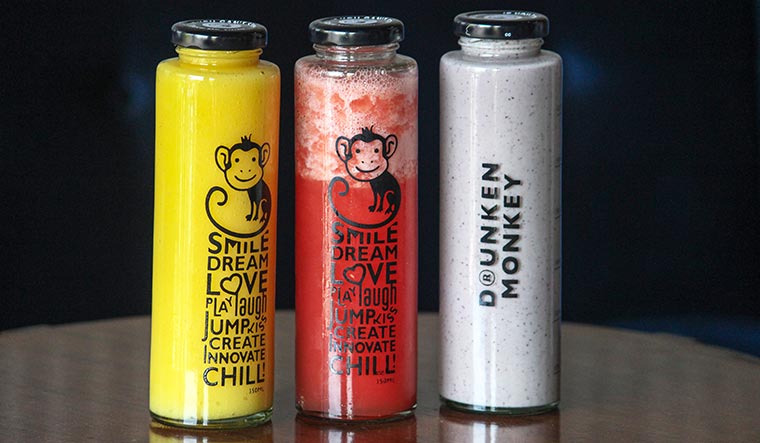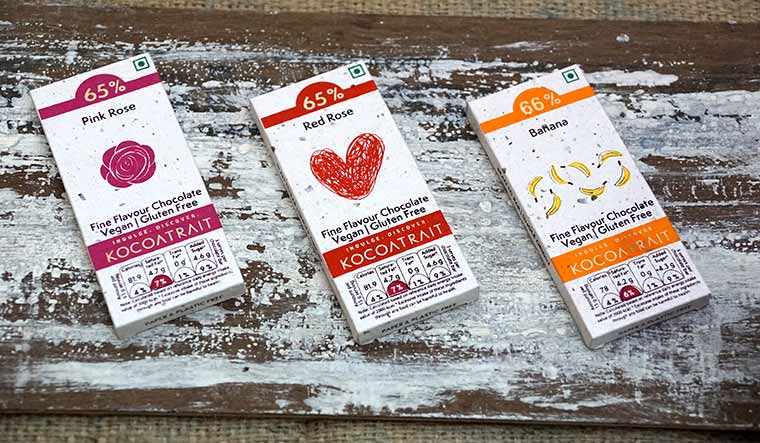Call it the pandemic effect or the fear of uncertainty, people are more mindful now than they were ever before. And this is not just to keep the virus away. The unprecedented halt to our fast-paced lives not only brought those dinner table conversations back but has also ignited a desire to bring about a lifestyle change. However, this change is not only associated with physical health but also the health of the ecosystem. It is important to understand that our actions have a direct impact on the environment; it may be subtle or drastic, but there is always an effect. So, why not make a positive impact?
With a vision to promote products that are environment-friendly, several companies across the country have come up with innovative changes to existing products. Maybe not directly to the product but the way it is produced and packaged. From juice cartons to takeaway food, packaging is ubiquitous in our daily lives. Most people tend to overlook the aspect of sustainable packaging which plays a pivotal role in solving landfill problems. The throw-away culture is rampant in our country and hence there is a need for zero-waste packaging where all the materials are reused or recycled. Here is a list of brands that have taken sustainable packaging way too seriously.
Responsible Whatr
Straight from a natural spring in Solan, Himachal Pradesh, Responsible Whatr is India’s first natural spring water beverage offered in a sustainable and endlessly recyclable aluminium can. It is a non-alcoholic beverage that was launched with a vision for a sustainable future and an agenda to reduce single-use plastic pollution. According to Ankur Chawla, CEO and co-founder of Responsible Whatr, the cans are made up of around 70 per cent recycled aluminium. “The material is a natural choice for packaging as it does not contribute to heaps of landfills. It does not alter the freshness of the water when exposed to light or heat. But when water in a plastic bottle is exposed to heat or sunlight, it has a tendency to become a carcinogen. A lot of research has been put into our product to make it highly sustainable,” says the 32-year-old who believes that sustainable packaging is serious business. He elaborates on a 2016 study by ICF International which found that the combined greenhouse gas (GHG) emissions associated with the transportation and refrigeration of beverages in aluminium cans are lower than those associated with beverages in glass or plastic bottles under the same conditions. “On a per litre beverage basis, emissions associated with transporting and cooling aluminium cans are 7 to 21 per cent lower than plastic bottles and 35 to 49 per cent lower than glass bottles, depending on the size of the comparative bottles as well as the types of refrigerators in which beverage is cooled prior to consumption,” he says. “An internal industry study done in India shows, in case of refrigeration, if the capacity of the refrigerator is 285l, 186 cans of 500ml could be accommodated vis-a-vis 86 bottles of 650ml. The approximate time required to reach 6°C is 11.5 hours for cans vis-a-vis 20.5 hours for bottles. In case of logistics, about double the number of cans are transported in a single consignment when compared to bottles.”
The spring water, which is purified without changing its natural properties and has a pH of 7.4. Starting from not pumping the water out from the ground and utilising only the free flow water, to using the aluminium in the cans made from 70 per cent recycled aluminium, the brand stands for being truly responsible. In addition to this, the entire production facility also harvests rainwater, which is used for irrigation.
The design of the can is clean yet elegant and luxurious-looking. “The story behind the brand name is a simple one. Usually, one does not expect water to come in a can so for clear communication we did play with the word ‘water’. Since we have always been speaking about taking the responsibility of bringing in a revolution and a solution to the enormous problem of landfill, the word ‘responsible’ came naturally handy. Both the words together convey a deeper and impactful purpose of the brand,” Ankur says. “We have come to realise that it (sustainable packaging) is more a necessity and not trend anymore. We at Responsible Whatr have made this a part of the culture for the organisation.” Ankur feels that it would not take long for everyone in India to adopt this new and improved lifestyle change initiated by Whatr. “Since we are a newly launched brand, the impact on customers and society will only be seen in a few months. We believe that little drops make the mighty ocean,” he says.
TöpCare, SOLO
While there is no harm in storage in aluminium cans, wrapping food in aluminium foil can be dangerous to health. Yes, the foil paper that has been an essential part of our daily lives—from packing our lunch to cooking grilled fish, vegetable or meat in the wrap—has adverse effects on the growth of human brain cells along with causing harm to one’s kidney, liver and could even prove fatal in the longer run. It reacts with salt, spices and other ingredient in the food and black spots often seen on the surface of food is the effect of this reaction. And worse, it is not biodegradable in the true sense. Although over a long period of time, it will break in to smaller pieces in landfill through oxidation, many recycling facilities do not take it as it is difficult to recycle when covered in food materials. For 24-year-old Naman Gupta, it was the concern for the health aspect that got him thinking of an alternative. “We (his family) are a bunch of avid readers and it was the knowledge of the harmful effects of the foil paper that triggered the idea of coming up with a better wrapping paper that is not only healthy for the body but also the environment,” Naman says.
TöpCare wrapping and baking paper hit the market 12 months back under the mother brand SOLO, which has been in the office stationery business for over three decades. The paper is made of wood fibre which is processed in a mill in Europe. “My family travels a lot internationally and we got our inspiration in Europe. We tied-up with a mill there that has been working in the paper domain for over 100 years. Although we call the health concern as our initial push, we also wanted to produce something that is completely natural and sustainable. This product is a new vertical for us and it definitely pushed us out of our comfort zone. But it is worth it” he says. The biggest challenge according to Naman is consumer awareness. “People still don’t know the side-effects of aluminium foil and educating them is going to take some time,” he says. The brand offers two products as of now—baking and cooking paper, and food wrapping paper. Both are versatile in nature, environment-friendly and sustainable. “We wanted to explore how to work around paper and its properties. Our baking and cooking paper can be reused up to five times. Even our wrapping paper can be reused but sometimes it gets coated with curry or sauce making it hard to reuse it. The papers are chlorine-free too,” says the Delhi-based entrepreneur.
The paper used by the brand is certified for adhering to US FDA and European Parliaments standards for coming in direct contact with dry, moist and fatty foodstuff. It is also tailored to meet the Indian requirements. The paper is priced slightly on the higher side but it is a very small price one pays considering its impact on health and environment. “Food, in our country, is something that is traditionally prepared by a mother. Every day when food is packed for the family, it is done with a lot of love and care. And this affection deserves top quality packaging. That is how we came up with our brand name,” Naman says. With a vision to expand and better existing products, he is on a mission to bring more sustainable products to the market.
Drunken Monkey
Samrat Reddy, founder of Drunken Monkey, was never a tea or a coffee lover. Whenever he went out with his friends during his college days in Chennai, he used to be on a lookout for smoothie or juice shops. “I always wondered why there are so many tea and coffee stalls and almost no smoothie shops,” he says. It was this thought that got him to do his own research on the reason why there aren’t many juice bars. “When I did my research while doing my MBA, I found that it is mainly because logistics are difficult and the margins are less,” Samrat says. Despite understanding the risks involved, he charted a plan for his business. “I spoke to many experts who gave me a negative response. They said a dosa or biriyani outlet would fetch money and not a smoothie store. But my vision was not just one store, I had a multi-store concept in my head. Therefore, I decided to come up with a plan that would negate all the flaws. It was definitely a difficult and money-taking process but I was in this for the long-haul and there was no turning back,” says the 35-year-old risktaker.
When Drunken Monkey opened its first outlet in 2015, the brand used plastic bottles to store and serve the smoothies. But within two months of its conception, Samrat decided that the brand would be completely plastic-free. “We took off the plastic straws and offered paper straws instead. We also switched to glass bottles that were specially designed for our brand. We as a brand strongly believe in everything being natural and our core product is also natural and fresh fruit smoothies,” says the Hyderabad-based entrepreneur. “It definitely increases the cost which varies with different material. Generally, we can say that there would be a minimum of 30 per cent increase in the cost of packaging. It does put some amount of burden, but it is a choice a brand has to make on the basis of their ethics.”
The glass bottle has a classy design with a wide neck which is ideal for serving and consuming thick smoothies. “The idea is to avoid the use of paper straws as well. The wide neck allows customers to drink the smoothies off the bottle. But we had a few people requesting us to keep the straws,” Samrat says. He believes that packaging is an important factor to accentuate the look, feel and the branding of the product. “In most cases there is a choice a brand needs to make between sustainable and non-sustainable packaging materials. This choice depends on both the cost and the convenience,” says Samrat. Drunken Monkey also educates its customers on how to reuse the bottles. From using it for storage and growing plants to doing artwork, the bottles can be used creatively for different purposes.
One may ask why the name ‘Drunken Monkey’ when the brand serves no alcohol. “The tag line of our brand is ‘naturally high’. What we mean by ‘drunken’ is that one does not need alcohol to get high; there are a lot of other ways to enjoy life. And monkey is an animal that is always happy. It also symbolises our core value of preserving nature and its elements,” Samrat says.
Currently, the brand is planning on getting environment-friendly paper cups. It also wants to convert to a subscription model where people would order for a month or a week.
Kocoatrait
For Chennai-based L. Nitin Chordia, who is India’s first certified chocolate taster, packaging is more than just being sustainable, it should be zero-waste. And this is the culture in his premium bean to bar chocolate brand Kocoatrait.
“We have been working on the sustainability side of our business for over two years now. And, I am proud to say that Kocoatrait is the world’s first and only brand with no plastic or paper packaging—the best part is that the brand is proudly Indian,” he says.
The packaging material is a fabric made of reclaimed cotton and cocoa husk. “The inner side of the packaging has mandala art templates, greetings, emergency contact list and habit trackers which make the wrapper reusable. Even when it comes to machinery, we have developed our own designs which are energy efficient,” says the chocolatier. But it does not stop here for Kocoatrait. Recently, the brand has switched from plastic-based ink for printing to water-based ink which is more eco-friendly. “This might be a small aspect for several consumers but for people who have taken sustainable living seriously, this is a big deal. It is a big change for us as well considering the changes in the back-end operations,” says Nitin. The brand has also made changes to the outer packaging from tin to palm-leaf based boxes. “We have tied-up with a Chettinadu-based self-help group for this project. The group not helps women in villages to earn a livelihood but also uses the proceeds for the development of villages. The group also has designers who have studied at prestigious institutes like NIFT,” he says.
Apart from retail chocolate bars, the brand has also come up with baking chocolate blocks. “The normal compound chocolate has vegetable oil in it while our brand offers organic chocolate with coco butter. The packaging for this product is also sustainable and zero-waste as we have recipes printed on the back of the cover. We are working closely with several home bakers as we feel it is important to encourage them,” says the 41-year-old chocolate sommelier. “One thing that I can boldly say is that consumers love zero-waste products. We, as a brand, are actually doing most of the job for their sustainable lifestyle. I think choosing the right products is the first step to sustainable living.” Kocoatrait plans on bringing out more novel packaging concepts in the future which would go beyond the conventional idea of sustainability. Looks like we are in for a treat!
Asahi Kasei
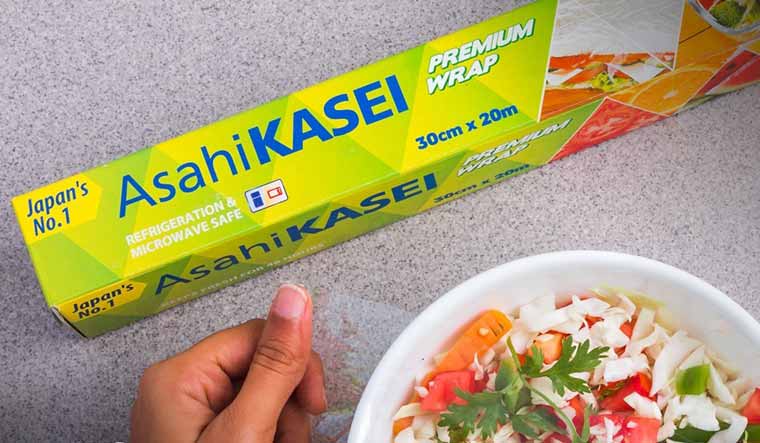
Although, we are all for going ‘vocal for local’, we love our imported goods. Seeing this love and also the potential to grow in the Indian wrapping market, thanks to the huge population of working women, Asahi Kasei, a multinational Japanese chemical company, launched its products in our country earlier this year. According to Luve Oberoi, Marketing Manager, Asahi Kasei India Pvt. Ltd., their three highlight products—premium wrap, cooking sheet, and frying pan foil—are a boon for the health-conscious homemakers, working women and anyone on the go. “They are extremely convenient to use and save on time that can be used to pursue other interests. Our main focus is promoting a healthy lifestyle,” he says. All the products come with a built-in cutter so it is easy to tear and easy to use. The premium wrap comes with a PVDC(Poly-Vinylidene Chloride) cling film which is far superior to PVC (polyvinyl chloride) or PE (polyethylene) cling film that is available in the market. It keeps food fresh for a longer time and prevents moisture and smells from seeping through. When it comes to the frying pan foil, it is coated with silicone on one side which prevents food from sticking to the foil. There is no need to use oil which limits any additional calorie intake. Zero oil usage removes the hassle of cleaning the pan afterward which saves time. The cooking sheet can be used for baking in the microwave oven and traditional ovens as well. There is no need to grease the baking pan or tray as it is coated with silicone on both sides and hence no need to wash them after use. Talk about things being convenient and healthy, all at the same time. “Even the stickiest food like macarons and chocolates does not stick to the tray,” says Luve.


